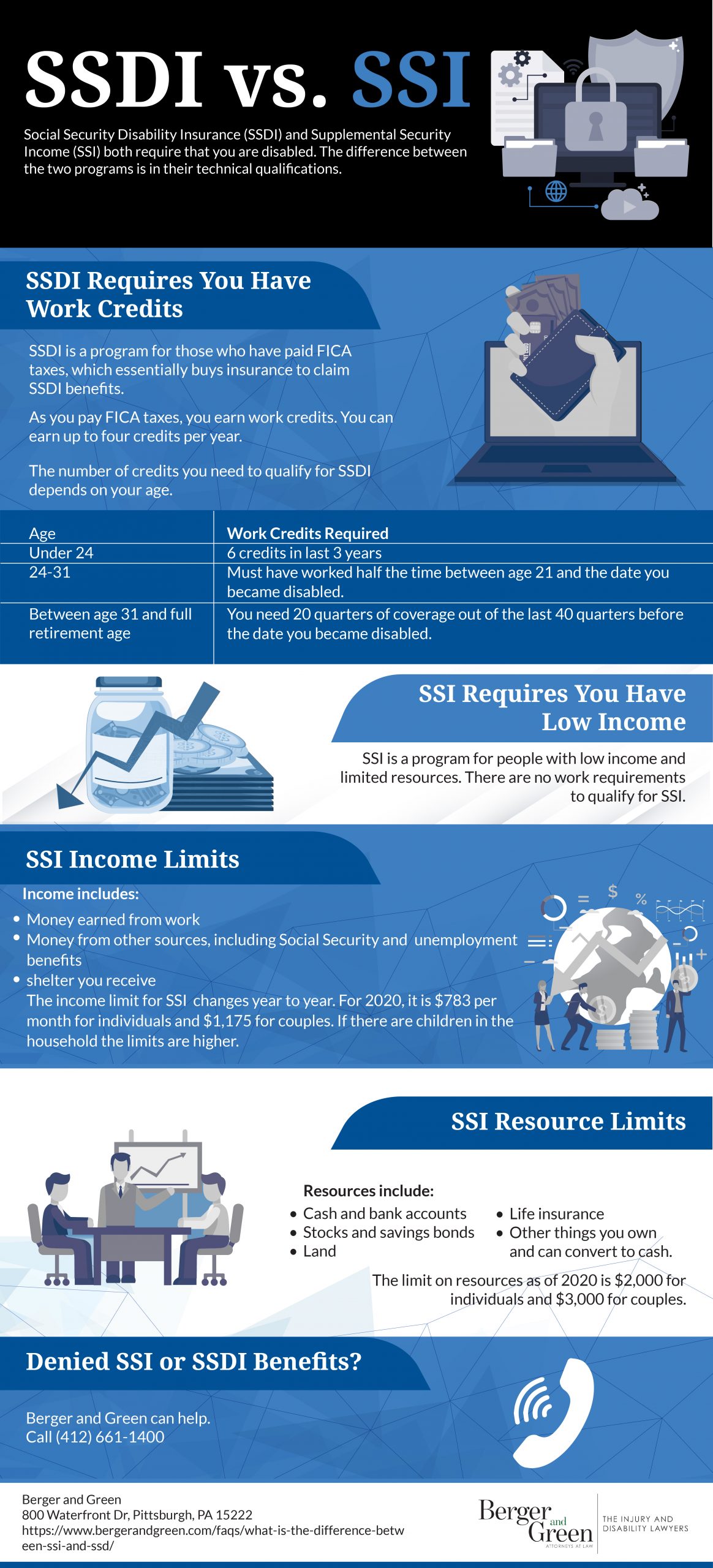
The Social Security Administration (SSA) runs two programs to help people with disabilities: Social Security Disability Insurance (SSDI) and Supplemental Security Income (SSI). Each program has different requirements, although there are some similarities. It is possible to qualify for only SSDI, only SSI, or both SSDI and SSI. If you qualify for both, you will not get a double benefit but a combination benefit which amounts to the highest of the two benefits.
If you would like assistance in pursuing either SSDI, SSI, or a combination of both, an attorney from our team is ready to assist you today. You may have many questions, and a Social Security Disability lawyer in Pittsburg with our firm can answer them.
What Is the SSDI Program?

The SSDI program provides benefits for applicants with physical or mental impairments that prevent them from working. You must be unable to work for a minimum of 12 months.
TheSSA explains that your condition must meet its definition of disability to receive SSDI benefits. Eligibility requirements demand that:
- You have worked and paid FICA taxes into Social Security Disability
- Your medical condition appears within the SSA’s list of disabling conditions
Many individuals with significant injuries and illnesses meet these criteria and are, therefore, eligible for a monthly benefit from the SSA. You may also qualify for SSDI benefits if you have a terminal illness.
The application process for SSDI benefits may demand an extensive review of your earnings record, medical history, disability claims, and other information that could be relevant to your current SSDI application. Having an attorney lead your application and fight for fair disability payments could prove immensely beneficial.
40+ years of experience from strong, knowledgeable, compassionate attorneys.
Start A Free EvaluationWhat Are Work Credits?
You must earnwork credits to be eligible for SSDI. SSI does not have this requirement.
For every three-month period that you work at a qualifying job that earns enough money and pays into the Social Security system, you earn work credits. Your contributions to the Social Security system come through wage deductions, which your employer is responsible for. As you pay contributions to the SSDI benefit program, you become entitled to receive SSDI benefits if you suffer a disabling injury or illness.
The longer you work in Social Security-qualifying jobs, the more work credits you accrue and the more SSDI benefits you become entitled to. Therefore, the amount of your monthly payments from SSDI (assuming you are eligible) will likely depend on your work history.
The number of work credits you need to qualify for SSDI depends on your age when you became disabled. An older person has had more working years and, therefore, more opportunities to earn work credits than a younger person. Accordingly, older people must earn more work credits than younger people. It would be unfair to disqualify someone due to a lack of enough work credits when they have not had the time to accumulate them.
We know you’re hurting. We can help. Free case evaluations, home and hospital visits.
Contact Us Now For HelpWhat Is SSI?
Supplemental Security Income is a safety net that keeps people with disabilities from becoming destitute. Toqualify for SSI, you must be disabled, blind, or age 65 and older. So long as your disability status falls within SSA’s list of recognized conditions, you may be eligible to receive SSI benefits.
Your income and assets are a key consideration when applying for SSI benefits. SSI is for those with limited income and assets, so if your income and resources exceed the limits, you may not qualify. An attorney from our team can review your case, explaining whether you have a disabling medical condition and meet the financial qualifications for SSI benefits.
There is no work history requirement, as SSI is a needs-based program.
You need an attorney with the experience and dedication to give your case the care it deserves.
Start A Free EvaluationHow Are SSDI and SSI Similar?
SSDI and SSI both:
- Provide monthly cash benefits
- Require that you are so disabled that you are unable to work
- Evaluate the severity of your health condition using the same medical criteria
- Provide access to health care benefits
While these programs have different eligibility requirements, both programs provide essential financial assistance to those who cannot support themselves due to a disability.
We can address all the legal hurdles that may be keeping you from getting a fair settlement.
Speak To An Attorney TodayWhat Are the Income Limits for SSDI and SSI?
Both SSDI and SSI have income limits. You are not eligible for either program if you make more money than the income limit. If you are earning over a certain amount, it is proof that you can work to support yourself.
For the SSDI program, the SSA measures your amount of income against the Substantial Gainful Activity (SGA) amount set for that year. The 2023 SGA monthly grossearnings limit is $1,470 or $2,460 if you are legally blind. If your income exceeds this limit, the SSA determines that you are not eligible for benefits based on your income.
The income limits for the SSI program in 2023 is $1,913. The income limit does increase for a couple and can be affected by the number of dependents you have. Our lawyers can help you understand if you qualify for exemptions or deductions.
What Are the Asset Limits for SSDI and SSI?
There are no asset limits for SSDI. You could own significant personal assets and still qualify for SSDI if you meet the work income, disability, and work credits requirements.
SSI, on the other hand, is only available for people with verylimited assets (or resources). An individual cannot own countable assets worth more than $2,000, while a couple cannot own more than $3,000 in assets. A countable asset is anything with cash value. Certain items, including your home, one vehicle, and certain life insurance policies, do not count toward this limit. Our lawyers can help you determine if you meet the asset limits for the SSI program.
How do I Apply for SSDI Benefits, SSI Benefits, or Both?
The process of applying for SSDI or SSI benefits generally requires:
- Obtaining documentation of the disabling medical conditions, which can include medical images, doctors’ records, and expert testimony about your injury or illness
- Securing records of Social Security-eligible income, which may be necessary to prove your work credits and qualify for SSDI benefits
- Submitting applications to the proper agencies
- Maintaining communication with the SSA to ensure the prompt processing of your application(s)
- Completing any necessary appeals in the face of a denial or undervaluation of your benefits
This process can be complicated and stressful, especially when dealing with a disabling medical condition. An attorney from our team will work to ensure the SSA makes the accurate disability determination, values your disability fairly, and provides the benefits you are entitled to.
Call Berger and Green Today for a Free Consultation About Pursuing Social Security Benefits
During your free consultation, Berger and Green can help you understand if you qualify for SSDI or SSI benefits. We can then assist in the application process and represent you in dealings with the SSA. Our guidance may make the application process (and appeals process, if necessary) easier for you.
Call Berger and Green today for a free consultation about completing your SSI or SSDI application.









